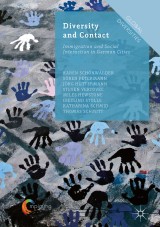Details

Diversity and Contact
Immigration and Social Interaction in German CitiesGlobal Diversities
|
96,29 € |
|
| Verlag: | Palgrave Macmillan |
| Format: | |
| Veröffentl.: | 21.11.2016 |
| ISBN/EAN: | 9781137586032 |
| Sprache: | englisch |
Dieses eBook enthält ein Wasserzeichen.
Beschreibungen
<div><div>This book analyzes how the socio-demographic and cultural diversity of societies affect the social interactions and attitudes of individuals and groups within them. Focusing on Germany, where in some cities more than one third of the population are first or second-generation immigrants, it examines how this phenomenon impacts on the ways in which urban residents interact, form friendships, and come to trust or resent each other. The authors, a distinguished team of sociologists, political scientists, social psychologists, anthropologists and geographers, present the results of their wide-ranging empirical research, which combines a 3-wave-panel survey, qualitative fieldwork, area explorations and analysis of official data. In doing so, they offer representative findings and deeper insights into how residents experience different neighbourhood contexts. Their conclusions are a significant contribution to our understanding of the implications of immigration and diversity, and of the conditions and consequences of intergroup interaction. This ground-breaking work will appeal to scholars across the Social Sciences. <br></div><div><br></div></div><div><br></div>
Chapter 1. Introduction.- Chapter 2. The 'Diversity and Contact' Project (DIVCON).- Chapter 3. Diversity in Germany and its Urban Neighbourhoods.- Chapter 4. Interactions Across Boundaries in More and Less Diverse Contexts.- Chapter 5. Five Stories of Neighbourhood, Social Life, and Diversity.- Chapter 6. Attitudes Towards Immigration-Related Diversity.- Chapter 7. The Immigrant Perspective.- Chapter 8. Conclusions. <div><br></div><div><br></div><div><br></div><div><br></div><div><br></div><div><br></div>
Karen Schönwälder is a Research Group Leader at the Max Planck Institute for the Study of Religious and Ethnic Diversity and Professor at the Georg August University in Göttingen, Germany.<div>Sören Petermann is Team Leader at GESIS – Leibniz-Institute for the Social Sciences, Germany.</div><div>Jörg Hüttermann is a Researcher at the Institute for Interdisciplinary Research on Conflict and Violence at Bielefeld University, Germany.<br></div><div>Steven Vertovec is Director at the Max Planck Institute for the Study of Religious and Ethnic Diversity, and Honorary Joint Professor of Sociology and Ethnology, University of Göttingen, Germany.<br></div><div>Miles Hewstone is Professor of Social Psychology at the University of Oxford, UK.<br></div><div>Dietlind Stolle is the Director of the Inter-University Centre for the Study of Democratic Citizenship at McGill University, Canada.<br></div><div>Katharina Schmid is Research Associate at the Oxford Centre for the Study of Intergroup Conflict, UK.<br></div><div>Thomas Schmitt is a Human Geographer at Friedrich-Alexander University in Erlangen-Nürnberg, Germany.<br></div><div><br></div>
<div><div>This book analyzes how the socio-demographic and cultural diversity of societies affect the social interactions and attitudes of individuals and groups within them. Focusing on Germany, where in some cities more than one third of the population are first or second-generation immigrants, it examines how this phenomenon impacts on the ways in which urban residents interact, form friendships, and come to trust or resent each other. The authors, a distinguished team of sociologists, political scientists, social psychologists, anthropologists and geographers, present the results of their wide-ranging empirical research, which combines a 3-wave-panel survey, qualitative fieldwork, area explorations and analysis of official data. In doing so, they offer representative findings and deeper insights into how residents experience different neighbourhood contexts. Their conclusions are a significant contribution to our understanding of the implications of immigration and diversity, and of the conditions and consequences of intergroup interaction. This ground-breaking work will appeal to scholars across the Social Sciences. <br></div><div><br></div></div>
<p>“With a complex research design, the large research team ventured to analyze what factors are decisive for this. Especially in difficult times, with conflicts of various kinds and with the risk of failure, it is exceptionally commendable to carve out the factors of a successful combination of "Diversity and Contact". … This has undoubtedly been highly successful, which is why this book deserves a great resonance in both academic and societal discussions.” (Wilhelm Heitmeyer, Bielefeld University, Germany)</p>
<p>“In Diversity and Contact, an extraordinary team of investigators applies a diverse array of research methodologies to show that distrust and isolation are not inevitable byproducts of ethnic diversity within urban neighborhoods. On the contrary, in Germany where ethnic segregation is limited, diversity turns out to be just another feature of urban normality. Levels of intergroup interaction are high, trust in foreigners is strong, diversity is appreciated, and over time contact with immigrants generates feelings of liking and trust. The book thus offers scholars and the public a superb demonstration the benefits of promoting residential integration in multiethnic societies.” (Douglas Massey, Princeton University, USA)</p>
<p>“Germany’s impressive leadership around contemporary migration to Europe demands that scholars everywhere better understand the challenges and successes of living in increasingly diverse cities. Diversity and Contact provides thoughtful analysis and hard data to show that casual interactions in diverse neighborhoods do not produce inevitable social tensions. Essential reading for academics and policymakers!” (Irene Bloemraad, University of California, Berkeley, USA)</p>
<p>“In Diversity and Contact, an extraordinary team of investigators applies a diverse array of research methodologies to show that distrust and isolation are not inevitable byproducts of ethnic diversity within urban neighborhoods. On the contrary, in Germany where ethnic segregation is limited, diversity turns out to be just another feature of urban normality. Levels of intergroup interaction are high, trust in foreigners is strong, diversity is appreciated, and over time contact with immigrants generates feelings of liking and trust. The book thus offers scholars and the public a superb demonstration the benefits of promoting residential integration in multiethnic societies.” (Douglas Massey, Princeton University, USA)</p>
<p>“Germany’s impressive leadership around contemporary migration to Europe demands that scholars everywhere better understand the challenges and successes of living in increasingly diverse cities. Diversity and Contact provides thoughtful analysis and hard data to show that casual interactions in diverse neighborhoods do not produce inevitable social tensions. Essential reading for academics and policymakers!” (Irene Bloemraad, University of California, Berkeley, USA)</p>

















